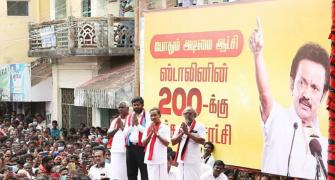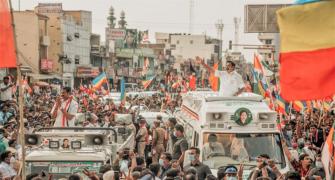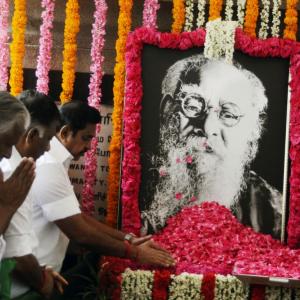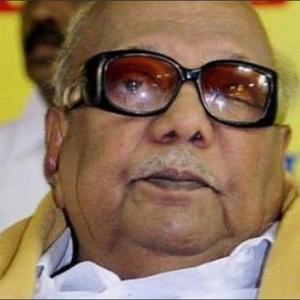A time has thus come when state encouragement for rural students led to empowerment of the socio-economically marginalised sections of the population. It included women. Today, with greater exposure and consequent enlightenment, it has gone beyond ‘empowerment’ to become ‘entitlement’, says N Sathiya Moorthy.

Long after the dust had settled down on the recent assembly polls in Tamil Nadu, whose results are due on May 2, one question will continue to linger and haunt every discourse on the ‘Dravidian’ socio-political and socio-economic discourse.
It will flow from the ‘competitive sops / freebies’ offered by the Dravidian Big-Two in the Dravida Munnetra Kazhagam and the All India Anna DMK, in their respective poll manifestos -- and the fiscal and economic viability of the same over the short, medium and long terms.
Tomes have already been written on the subject, with most economists and editorial writers laughing at promises of monthly cash doles to housewives, purportedly to make both ends meet in these days of post-demonetisation, Covid-induced joblessness and loss of personal and family incomes.
Add to that the AIADMK’s revived offer of the unimplemented governmental gift of washing machines for poor families, carried forward from the party’s manifesto for elections 2016, and the picture is complete.
Some media reports have estimated the AIADMK’s poll promises to cost a high Rs 80,000 crores in a fiscal year, or Rs 4-lakh crores over the five-year term of a government. This, editorial-writers have pointed out, would pile up over the accumulated state debt of Rs 5-lakh crores, up from Rs 1-lakh crores that the AIADMK government of late chief minister Jayalalithaa inherited in 2011. No one has made such studied calculations about the DMK offerings.
Critics have a point, but the Dravidian polity has always been focussing on ‘social infrastructure’ even if it meant that the state would be seen as losing out in fiscal terms. What more, as AIADMK’s Chief Minister Edappadi K Palaniswami pointed out, every other state government and also the Centre have been borrowing heavily to meet their own revenue commitments, which is what Tamil Nadu has also been doing.
As for boosting the economy, EPS has pointed to his own performance as chief minister. Despite the global pandemic, the state has been able to double fresh investments, next only to Maharashtra, with the total adding up to Rs 1 lakh crores in the just completed fiscal 2020-21.
His ministerial colleagues are also not tired of recalling how over the past years since EPS became chief minister, Tamil Nadu has been chosen as the best-performing state on a range of social and economic indicators, by various departments and agencies of the Centre.
Yet, there is no knowing how an AIADMK government, if returned to power for a third term in a row, will be able to finance the poll promises, given the dire situation in which the state finds itself. In comparison, the rival DMK’s poll manifesto has what reads as a passing pointer, based on plans to boost the treasury’s income through better management of the government’s ‘mineral sales’.
The party seems to believe that there is enough money in minerals, which has either remained untapped or wantonly diverted through past years and decades.
In defence of ‘Dravidian economics’, if it could be called so, it should be said that the Big-Two’s promise of a monthly family dole has to be seen in the larger context of what traditional political economists have been asking for through demonetisation, through pandemic job and incomes losses.
‘Putting money in the hands of the consumer’ is how they have phrased it, only that their perception is in terms of lakhs, crores and lakhs of crores. In contrast, the AIADMK has promised Rs 1,000 pm and the DMK, Rs 1,500.
DMK’s M K Stalin has also promised a one-time lumpsum payment of Rs 4,000 per month for poor families, on June 3, the birth anniversary of his late father and five-term chief minister M Karunanidhi – that is, if the party came back to power after a 10-year gap. EPS has already done his good deed for the year through a Rs 1000-dole in the midst of the pandemic last year, and by increasing the annual Pongal gift from Rs 1,000 to Rs 2,500.
Yes, these moneys may not help revive the automobile industry, or textiles or other manufacturing industries, starting with those based in the state. But they surely are going to stimulate greater money circulation up to a level, where it matters to the state, its immediate economic commitments and social worries and concerns.
One more thing is for sure. This kind of Rs 1,000 or Rs 1,500 dole is not going to be taken out and hoarded or diverted, as is often the case with massive re-financing of sick banks and industries. Instead, to the last paisa, these moneys are going to be spent -- and thus ploughed back into the economy.
No one has calculated the revenue earnings that come back to the state government, but then there is an inevitable anomaly, which a post-poll state government may ask the Centre to correct. The question is about a share of the GST accruing out of such spending by the dole beneficiaries going to the Centre, which however has not earned a paisa thereof. This also contrasts with the Centre’s scheme of imposing cess for some products, all of which go only to its coffers, without any share for the state governments.
In a way, the Tamil Nadu sops of the past years and decades come as a package -- and they repay as a package. In a state where Nature has not unburdened its wealth adequately, moving away from traditional agriculture to manufacturing was possible through the early decades after Independence but not afterwards.
For over the past two decades, coinciding with the era of ‘economic reforms’, the state is known better as a ‘service sectors’ hub. Chennai is both the ‘Detroit of India’ and the ‘Mecca of Medicare’, without losing sight of the opportunities offered by the IT and ITES sectors. In all these sectors, Tier-Two and Tier-Three cities in the state are already giving tough competition to Chennai.
All these have caused an increasing demand for a high number of skilled labour, and those trained in superior technologies, in medicines, auto industry and the IT-ITES sectors, Owing to historic reasons, Tamil Nadu has been known for disciplined labour with relatively superior skills who are also industry-friendly.
Successive governments have exploited this situation, to attract investments, by providing sops, as much to the industries. Thus, the post-reforms AIADMK government of chief minister Jayalalithaa in its first term (1991-96) became one of the first states in the country to attract big-ticket FDI projects in car and glass manufacturing.
The successor government of DMK’s Karunanidhi, while taking forward the same, also reached out to the IT sector, particularly start-ups and the rest, by building the ‘Tidel Park’ technology hub in the heart of the state capital, for them to fall back upon for office space and high-speed connectivity, which was otherwise unavailable in those early years.
But all of it comes only with medium and long-term planning. Starting with the Kamaraj government of the ruling Congress party in the mid-fifties, free education, free meals and free uniforms, etc, first at the school-level and then on to college-level, alone helped create such a massive pool of relatively talented workers.
Their social skills may still be found wanting for want of exposure but their societal behaviour has improved vastly when compared to their parental generations -- and their own generations elsewhere in the country. Understanding the gaps in the social skills component of the first-generation graduates, and later professionals like doctors and engineers, the state government introduced a ‘social skills’ curriculum for all university students.
The results may not be as encouraging as thought to be, but the government did try -- and more recent batches of students have at least been made aware of their shortcomings and they have found their own ways and means to address the same and bridge the gap, to a greater or lesser extent.
Considering that this was the generation of youth, and theirs was the socio-economic background the participants, the unprecedented, un-politicised state-wide ‘Jallikattu protests’ of January 2017 still stands testimony to their sentiments, organisational skills -- and disciplined approach to issues and concerns that have been basic to their being as a 21st century Tamil youth.
Beginning with the Justice Party progenitor’s rule a century back in the then Madras Presidency, ‘social justice’ has remained the life blood of Tamils and Tamil Nadu, and their own Dravidian polity. Starting with community-based reservations that did not deny the upper-caste Brahmins their share either, unlike often misunderstood and/or mis-represented since, it has gone through a degree of next-stage contemporariness through and through.
It is thus that even a non-Dravidian, anti-Dravidian Congress chief minister K Kamaraj had to re-invent the party’s socio-political moorings by adding free education and free noon meals to the Nehruvian socialist model, which included free housing for SC-ST, who already had reservations under the post-Independence Constitution.
In a way, controversial predecessor Rajaji government’s ‘Modified Elementary Education’ scheme was a starter but his bad packaging and handling led to politico-ideological rival, Periyar, damning it as ‘Kula Kalvi Thittam’’. It paved the way for Rajaji’s exit, not the scheme, which Kamaraj continued without a hitch.
As chief minister (1977-87), AIADMK founder M G Ramachandran (MGR) resurrected Kamaraj’s free meals scheme and also opened up professional college education to the private sector as pupils who grew up on his nutritious noon meal scheme were alive, aware and aspirational enough to touch personal pinnacles that their grandparents did not know existed, and their parents did not think was possible for their class.
Under successive Dravidian party chief ministers from DMK founder C N Annadurai (1967-69), Karunanidhi, MGR and Jayalalithaa, and now EPS, every government in the state over the past 54 long years has built upon the inherited socio-economic matrix, which they left for the successor with further add-ons of their own.
Thus, free bicycle and scootys (especially for girl students and working women), laptops and now tablets for college students (the latter promised by the DMK now), each one of the freebies has an economic purpose for the individual and the homestead, over the past decades.
In an era where semi-literate rural women (at least in the state) also need more than unsure and periodic work as farm labour and are thus gainfully employed in factories and malls in nearby towns and cities, cooking gas, stoves, mixers and grinders mean a lot in terms of saving time and drudgery in the traditional household work that they cannot -- and do not -- forsake.
If a free TV set is of poor quality, or free internet connectivity for students in their homes does not work properly, it has nothing to do with the policy per se. It has everything to do with implementation. However, as in importing ‘cheap TV sets’ (say from China and/or Taiwan), the DMK government of the day also learnt that they were denying the state SMEs their due share in the government-centric economic progress.
A time has thus come when state encouragement for rural students led to empowerment of the socio-economically marginalised sections of the population. It included women. Today, with greater exposure and consequent enlightenment, it has gone beyond ‘empowerment’ to become ‘entitlement’.
If the AIADMK government of EPS, for instance, cancelled cooperative loans or the predecessor Karunanidhi dispensation cancelled farm loans running into thousands of crores, it owed to the rural folks’ acquired knowledge on the high-volume NPAs of nationalised banks, which had benefited the rich and powerful.
Whether voiced or not, there is expectation from political parties, as people read every word of their poll manifestos and watch talk-show debates in Tamil TV channels -- unlike as used to be the case during an intervening three-decade period.
It is this sense of empowerment, translating as entitlement, which is now seeing the Tamils’ opposition to NEET (as it also threatens to interfere with the nation’s best public health services that is now available in the state which run parallel to the private enterprise in the sector), over the long term in particular.
And the man on the street is aware of those consequences, unlike often misunderstood by the elite, both inside the state and outside.
N Sathiya Moorthy, veteran journalist, political analyst and author, is Distinguished Fellow and Head-Chennai Initiative, Observer Research Foundation.










